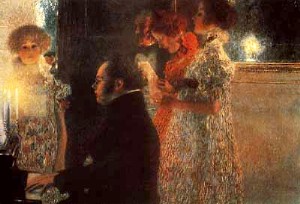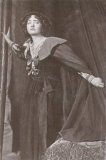Sunday, June 18, 2006
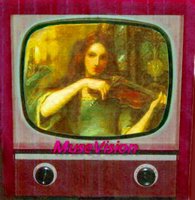
Welcome MuseVision Readers. The June 2006 edition features Anne Finch, poet of the 17th – 18th centuries. Also included is a Video by the Magical Mystery Trio, featuring music by the Fab Four – OK, The Beatles. Cliff, our dedicated moderator continues with a digression about music and poetry. We indulged him this time. Also included are some words about Gustav Klimt’s “Schubert” painting in a new section called “Why we love this painting”. A Dorothea Baird photos update rounds things out.

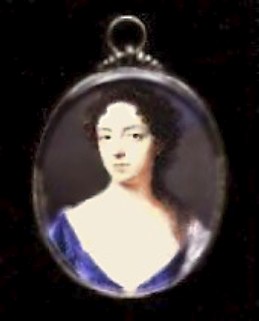
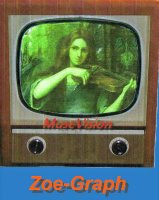
Take a look at some pictures of an intriguing looking woman. I found them on the web one day while just Googling the name “Anne” to while away the time. I began researching and soon realized I had stumbled on another very interesting character. The images are of Anne Kingsmill Finch, an English poet who lived from 1661 through 1720. She is also known as Anne of Winchilsea. She occupies an important place in British poetry as she was one of the first published women poets. The time is which she lived is one of my favorites in Art and Music history. She was married just about the same time Bach and Handel were born and she lived about the same time as
These pictures from
Her biography is interesting, yet complicated. She met her future husband, Heneage Finch, while she was Lady in Waiting to Mary of Modena, Queen Consort to James II of
Even today, Anne’s work exerts an influence on other creative people - a rare thing for poets of such a seemingly remote era. A sculptor in
Some examples of Anne Finch's poetry.
To The Nightingale
Exert thy Voice, sweet Harbinger of Spring!
This Moment is thy Time to sing,
This Moment I attend to Praise,
And set my Numbers to thy Layes.
Free as thine shall be my Song;
As thy Musick, short, or long.
Poets, wild as thee, were born,
Pleasing best when unconfin'd,
When to Please is least design'd,
Soothing but their Cares to rest;
Cares do still their Thoughts molest,
And still th' unhappy Poet's Breast,
Like thine, when best he sings, is plac'd against a Thorn.
She begins, Let all be still!
Muse, thy Promise now fulfill!
Sweet, oh! sweet, still sweeter yet
Can thy Words such Accents fit,
Canst thou Syllables refine,
Melt a Sense that shall retain
Still some Spirit of the Brain,
Till with Sounds like these it join.
'Twill not be! then change thy Note;
Let division shake thy Throat.
Hark! Division now she tries;
Yet as far the Muse outflies.
Cease then, prithee, cease thy Tune;
Trifler, wilt thou sing till June?
Till thy Bus'ness all lies waste,
And the Time of Building's past!
Thus we Poets that have Speech,
Unlike what thy Forests teach,
If a fluent Vein be shown
That's transcendant to our own,
Criticize, reform, or preach,
Or censure what we cannot reach.
To Death:
O King of terrours, whose unbounded sway
All that have life, must certainly obey.
The King, the Priest, the Prophet, all are thine,
Nor wou'd ev'n God, (in Flesh) thy stroke decline.
My name is on thy Role and sure I must,
Increase thy gloomy kingdoms, in the dust,
My soul at this, no apprehension feels,
But trembles at thy swords, thy racks, thy wheels,
Thy scorching fevers, which distract the sense,
And snatch us raving, unprepar'd from hence;
At thy contagious darts, that wound the heads
Of weeping friends, that wait at dying beds.
Spare these, and let thy time be when it will,
My business is to die, and thine to kill.
Gently, thy fatal sceptre on me lay,
And take to thy cold arms, insensibly thy prey
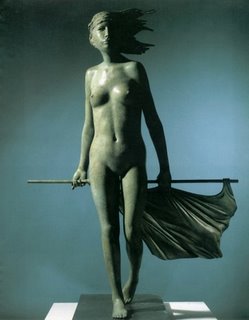 Ralph Brown's Sculpture based on an image from Anne's poem, " All is Vanity".
Ralph Brown's Sculpture based on an image from Anne's poem, " All is Vanity". Ensemble, Musica Dolce
Ensemble, Musica Dolce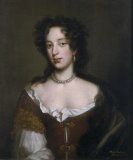 Mary of Modena
Mary of Modena 

On the Road with a Bass-playing Poetry Accompanist
Having spent most of my life obsessed with music, poetry has always had to come in through the back door. I was crazy about Poe’s works when I was very young and I managed to glean a smattering of meaning from various English classes. I had one teacher who loved poetry greatly and I’m loathe to admit that I did more than my share of dozing in his classes - not because there was anything wrong with his teaching at all. The fault was mine entirely. I finally got my act together and many years later wrote him a letter of apology. I’ve tried to clean up my peasant-like condition and just in time, too. I now have friends who take great delight in Poetry as well as having a daughter who is a great student of the subject. In deference to them, I try not to expose my prodigal past.
One highlight of my poetry experience was doing dramatic readings of poems accompanied by improvised music. I would read the poems and some of my friends would make up the music. Sometimes we'd switch and I would imrpovise, too. That was a lot of fun back in the sixties. The audience seemed to get a kick out of it. This fact sets up an interesting tale from a bass playing friend of mine. Let’s call him Bob. Bob is a true classical bassist, meaning that classical music is all he plays. Jazz is not in his lexicon. Bassists who plays in every style are a different breed altogether. Classical Bassists are usually very affable people who believe they represent a long tradition of musical high ground. They consider themselves the unspoken leaders of the orchestra, and, while all the other instrumentalists have some sort of quaint opinion of their own place in the musical scheme of things, the bass players are true believers in their own importance. If you could say that first violinists seem like caffeinated, puritanical chipmunks, than you could say that bass players seem like long-suffering lions. After hours, bass players can be extraordinary good-time Charlies.
So, back to Bob…. Bob and I used to travel together to out of town gigs. Bass players always have a fine large station wagon or van to carry their elephant sized instrument We always yakked constantly and flipped from one topic to another. I avoided too much political blather since I am rather conservative , compared to most musicians, and usually try to avoid seeming like a fossil from a former age (even though that's true). After concerts we would head out home. Bob would plant a bottle of Jim Beam on the dashboard; light up a J and off we would go. Of course this was some years ago, before he knew better. After all, this is the twenty-first century and better judgement rules. One day, while traveling to an engagement, I was mentioning that I had read about a police raid at a farm in
This scene was verified for me in the biography that Anne Sexton’s daughter, Linda Gray Sexton, wrote…. I actually bought the book and read it. Not that I knew or cared much for Anne’s work, but I wanted to read about the effect crazy people have on others. The book does not disappoint. Anyway, she describes various poetry readings attended by her and her mother. It seems you have two followings at these events, the Apollonian and the Dionysian. The Apollonian folks go home after the punch and cake and read more poetry. The Dionysian people are just getting started for the evening. The punch and cake are the just the beginning.
With my own musical obsessions now pretty much contained, I have to admit I am turning back to poetry. A friend once suggested that there must be an answer to why people hold poetry in lower regard today than in the past, when some even chose to speak poetically. There must be lots of good reasons. Any ideas?
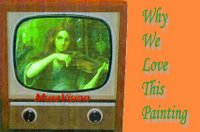
Gustav Klimt's "Schubert at the Piano"
A Musical Soiree can be among the most rewarding evenings of one’s whole life. If you are a musician or a music lover, being invited to a sumptuous evening of songs and chamber music is something to be highly regarded, because this is where we make music as well as make musical friends and alliances. Some forms of music can only be aired and shared in such a setting. The combination of music, friends, food and conversation is irresistible. This is where you learn what sounds good, what moves people, and what’s on peoples minds.
Klimt brings us into the middle of such an occasion and presents us with one of its highlights. Franz Schubert wrote some of the most memorable songs, chamber music and piano solos of the early 19th century. In Klimt’s painting, you can truly “hear” the warm musical moment emanating from the piano and the experience is verified by the rapt faces of the listeners, some of whom may be musicians or music lovers. It’s difficult to remember any other image that captures more fully all the details and atmosphere of a soiree. Klimt was a great admirer of Schubert, of course, and his own reaction to Schubert's music must surely be captured in the faces of the listeners. They say the painting was destroyed during WWII when a bomb hit the building in which it was housed. A fire ensued and it was reduced to ashes. The image lives on and continues to inspire us and that is - why we love this painting.
